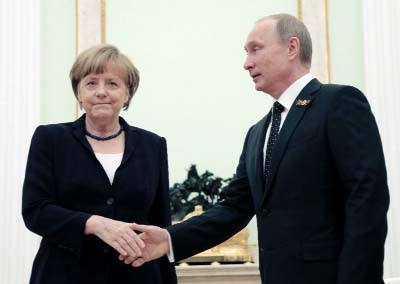
AFP, Sochi :
German Chancellor Angela Merkel will Tuesday meet President Vladimir Putin in the Black Sea resort of Sochi in her first visit to Russia since 2015, signalling renewed dialogue between Berlin and Moscow.
The Russian and German leaders have scaled back links as Moscow’s ties with the EU have plunged to a post-Cold War low.
Merkel has strongly backed EU sanctions on Moscow for seizing Crimea from Ukraine in 2014 and backing the pro-Russian separatist insurgency in the east of the country.
Moscow has responded with an embargo on agricultural products from the West.
In her first official visit to Russia last week, EU foreign affairs chief Federica Mogherini insisted that cooperation between the two sides was “not frozen” but said that progress was hampered by profound disagreements on subjects including Ukraine and Syria.
Merkel’s visit to Russia comes after Putin called for the countries’ relations “to fully normalise”, while meeting German Foreign Minister Sigmar Gabriel in March.
Merkel last visited Russia in May 2015 when she met Putin in Moscow but, like most Western leaders, snubbed a Red Square parade for the 70th anniversary of World War II victory.
Berlin and Moscow said Tuesday’s talks agenda includes preparations for July’s G20 summit in Germany as well as Ukraine and Syria.
·Merkel has been the main mediator with Putin over the crisis in Ukraine. She is a key proponent of keeping sanctions on Moscow in place until a stalled peace plan to end the conflict in Europe’s backyard is fulfilled.
Merkel and Putin have taken part in a number of four-way meetings, most recently last October, with Ukrainian President Petro Poroshenko and France’s Francois Hollande aimed at implementing the plan the four countries hammered out in February 2015.
last month, Merkel and Putin took part in a four-way phone conversation with Poroshenko and Hollande, agreeing to step up implementation of the peace deal.
“There are two topics that weigh down relations… the annexation of Crimea contrary to international law and then the destabilisation of eastern Ukraine by pro-Russian separatists,” Merkel spokesman Steffen Seibert told journalists ahead of the visit. Kiev and the West accuse Moscow of giving military support to the rebels in eastern Ukraine, a charge it denies.
Seibert called this “a difficult context that one cannot ignore,” but added that “our intention is to try to integrate Russia into constructive agreements.”
German Chancellor Angela Merkel will Tuesday meet President Vladimir Putin in the Black Sea resort of Sochi in her first visit to Russia since 2015, signalling renewed dialogue between Berlin and Moscow.
The Russian and German leaders have scaled back links as Moscow’s ties with the EU have plunged to a post-Cold War low.
Merkel has strongly backed EU sanctions on Moscow for seizing Crimea from Ukraine in 2014 and backing the pro-Russian separatist insurgency in the east of the country.
Moscow has responded with an embargo on agricultural products from the West.
In her first official visit to Russia last week, EU foreign affairs chief Federica Mogherini insisted that cooperation between the two sides was “not frozen” but said that progress was hampered by profound disagreements on subjects including Ukraine and Syria.
Merkel’s visit to Russia comes after Putin called for the countries’ relations “to fully normalise”, while meeting German Foreign Minister Sigmar Gabriel in March.
Merkel last visited Russia in May 2015 when she met Putin in Moscow but, like most Western leaders, snubbed a Red Square parade for the 70th anniversary of World War II victory.
Berlin and Moscow said Tuesday’s talks agenda includes preparations for July’s G20 summit in Germany as well as Ukraine and Syria.
·Merkel has been the main mediator with Putin over the crisis in Ukraine. She is a key proponent of keeping sanctions on Moscow in place until a stalled peace plan to end the conflict in Europe’s backyard is fulfilled.
Merkel and Putin have taken part in a number of four-way meetings, most recently last October, with Ukrainian President Petro Poroshenko and France’s Francois Hollande aimed at implementing the plan the four countries hammered out in February 2015.
last month, Merkel and Putin took part in a four-way phone conversation with Poroshenko and Hollande, agreeing to step up implementation of the peace deal.
“There are two topics that weigh down relations… the annexation of Crimea contrary to international law and then the destabilisation of eastern Ukraine by pro-Russian separatists,” Merkel spokesman Steffen Seibert told journalists ahead of the visit. Kiev and the West accuse Moscow of giving military support to the rebels in eastern Ukraine, a charge it denies.
Seibert called this “a difficult context that one cannot ignore,” but added that “our intention is to try to integrate Russia into constructive agreements.”

